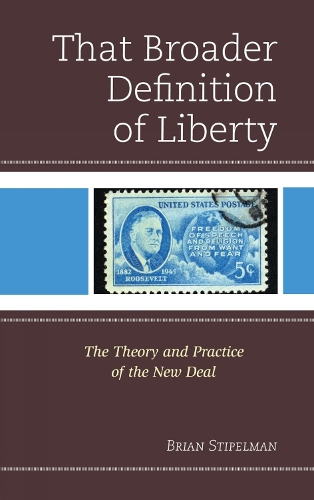
That Broader Definition of Liberty: The Theory and Practice of the New Deal
(Paperback)
Publishing Details
That Broader Definition of Liberty: The Theory and Practice of the New Deal
By (Author) Brian Stipelman
Bloomsbury Publishing PLC
Lexington Books
23rd May 2014
United States
Classifications
Professional and Scholarly
Non Fiction
Political science and theory
Political leaders and leadership
973.917
Physical Properties
Paperback
344
Width 156mm, Height 228mm, Spine 26mm
517g
Description
That Broader Definition of Liberty synthesizes a political theory of the New Deal from the writings of Franklin Roosevelt, Eleanor Roosevelt, Henry Wallace, and Thurman Arnold. The resultant theory highlights the need for the public accountability of private economic power, arguing that when the private economic realm is unable to adequately guarantee the rights of citizens, the state must intervene to protect those rights. The New Deal created a new American social contract that accorded our right to the pursuit of happiness a status equal to liberty, and grounded both in an expansive idea of security as the necessary precondition for the exercise of either. This was connected to a theory of the common good that privileged the consumer as the central category while simultaneously working to limit the worst excesses of consumption-oriented individualism. This theory of ends was supplemented by a theory of practice that focused on ways to institutionalize progressive politics in a conservative institutional context. Brian Stipelman, drawing upon a mixture of history, American political development, and political theory, offers a comprehensive theory of the New Deal, covering both the ends it hoped to achieve and the means it used to achieve them.
Reviews
[This is a] unique work in the field that will garner much praise from scholars in political science, political theory, and history. . . . [Stipelman] presents a fresh, vigorous analysis of the theoretical and political underpinnings of the New Deal and assesses not only its roots and successes, but also its continued relevance for contemporary politics, policy, and theory. For far too long, scholarship on the New Deal has been almost exclusively the domain of historians and historically-oriented political scientists. This study offers something unique and bold: a study of the political theory of the New Deal conceived not in abstract terms, but in terms of real politics while offering a compelling argument for the continued relevance of the theory of the New Deal for contemporary politics and political thought. Although the author focuses upon a set of thinkersspecifically Franklin Roosevelt, Henry Wallace, Thurman Arnold, and Eleanor Roosevelthe escapes the typical trap of biography and the reduction of the New Deal to individual thinkers alone. This is an important, and timely work. -- Michael J. Thompson, William Paterson University
An important book for both citizens and scholars. Brian Stipelman explores the meaning of the New Dealas political theory, as political practice, and as a story to be understood and passed on. His meticulous scholarship offers us a powerful new understanding of the New Deal. His engaging conclusions offer us a fresh way to think about politicsand about liberalism in America. Bold, fresh, elegant, thoughtful, wise, and highly recommended. -- Brown University, James A. Morone, Brown University
Historians and political scientists largely have viewed the New Deal as an almost purely political project. While a few historians and scholars of American political development have outlined a political theory of the New Deal, Stipelman (Dowling College) offers what is likely the first book-length study that takes seriously the ideas of New Deal Democrats. The author focuses on four key figures: Franklin Delano Roosevelt; his wife, Eleanor; his key aide (and eventual vice president), Henry A. Wallace; and the legal scholar and practitioner Thurman Arnold. Going beyond these thinkers' ideas about state intervention and institution building, Stipelman articulates the key assumptions about economics, liberty and happiness, and class structure that underlie their political thought. Some scholars may disagree with the author's emphasis on particular aspects of New Deal theory, such as the choice of consumerism as the basis of happiness and security. But even critical readers will appreciate this fine volume for its role in starting the conversation. Summing Up: Highly recommended. * CHOICE *
Author Bio
Brian Stipelman teaches American politics and political theory at Dowling College.
